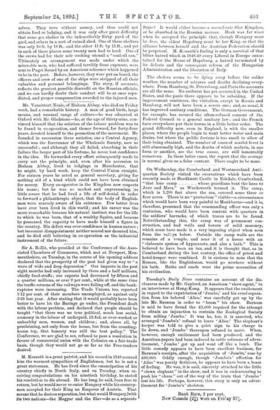On Wednesday, the Cumberland and Westmoreland Anti- quarian Society visited
the excavations which have been recently made at Hardknott Castle in Eskdale, Cumberland, "that lone camp whose guardians bent the knee to Jove and Mars," as Wordsworth termed it. The camp, which is 1,290 feet above the sea, covered some three or four acres. There is no " prwtorium " visible—a circumstance which would have been very painful to Monkbarns—and it is, therefore, presumed that the commanding officer was only a centurion, who would have been content with quarters in the soldiers' barracks, of which traces are to be found. Notwithstanding this, the camp was of permanent con- struction, and had walls and towers of solid masonry, which must have made it a very imposing object when seen from the valleys below. Outside the camp walls are the remains of a temple, and near it of a house with an "elaborate system of hypocausts, and also a bath." This is believed to have been an inn, and it is thought that, as in Cumberland during the last century, the office of priest and hotel-keeper were combined. It is curious to note that the Roman, like the Englishman, would go nowhere without his bath. Baths and roads were the prime necessities of his civilisation.


































 Previous page
Previous page